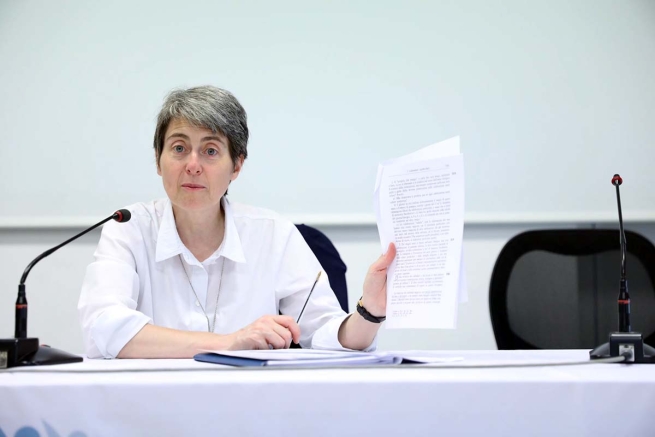In the light of the magisterial texts on the subject, Sr Massimi, who also collaborated directly on the third and last edition of the Roman Missal in Italian and is working on the revision of the Salesian Proper, focused her attention on the management of the different calendars, recalling the need to reconcile two different needs: that of "preserving the integrity of the General Calendar as an expression, among other things, of the substantial unity of the Roman Rite" (cf. Sacrosanctum Concilium, no. 38), with attention to diversification and necessary inculturation at the local level. In this case, Sr Massimi proposed the treasuring of local cults, also proposing possible solutions (what is memorialized at the general level can be feasted at the local level).
Explaining her work in collaboration with the Congregation for Divine Worship with her experience and a wealth of anecdotes, the FMA nun threw some fundamental lights: the attention to the collects, so that they are simple and brief, but truly evocative and consistent with only what really connoted the life of the saint, also in the light of historical research; and the care of the language, which must be different from the everyday, poetic and symbolic ("transfigured", in technical terms), but intercepted by the common faithful, and above all, in the case of the Salesian Proper, with an educational and youthful horizon - which, at the same time, knows how to avoid the risk of being so topical as to grow old immediately.
At the same time, she did not deny the present challenges: for example, the increase in the number of the Blesseds and Saints of the Salesian Family, together with the other exceptions already authorized in the Salesian Proper, has already determined - and with good probability will determine even more in the future - a "clogging up" in the possible options and overlaps with the General Calendar and perhaps also with the diocesan ones. In this regard, she emphasized, on the one hand, the need to know how to live the "feriality" without necessarily overloading it with feasts; and on the other, the sensitivity to be shown towards cults and devotions already established and rooted, in the awareness that the figures of holiness never overshadow the one Lord and Saviour, but are testimonies of persons who have concretely manifested the paschal mystery of Christ, in one of its countless facets.
In the objective complexity of the subject, the Daughter of Mary Help of Christians also wished to reassure the participants by offering some guidelines: she highlighted how the choice to make a memorial optional says nothing about its relevance. "Optional does not mean less important: it means that you have the possibility of discernment". And she also reiterated the centrality of praxis in the Church's tradition regarding the choice of how to celebrate certain cults, especially at the local level.
Lastly, Sr Massimi opened the door to a different use of the texts offered by the missal and lectionary to go beyond the liturgy itself, by offering some practical orientation. In other words, to make pastoral use of the Salesian Proper and exploit it for celebrations such as vigils, novenas, moments of prayer, reading of the Word... So as to bring boys and girls closer to the beauty of prayer in all its forms.


